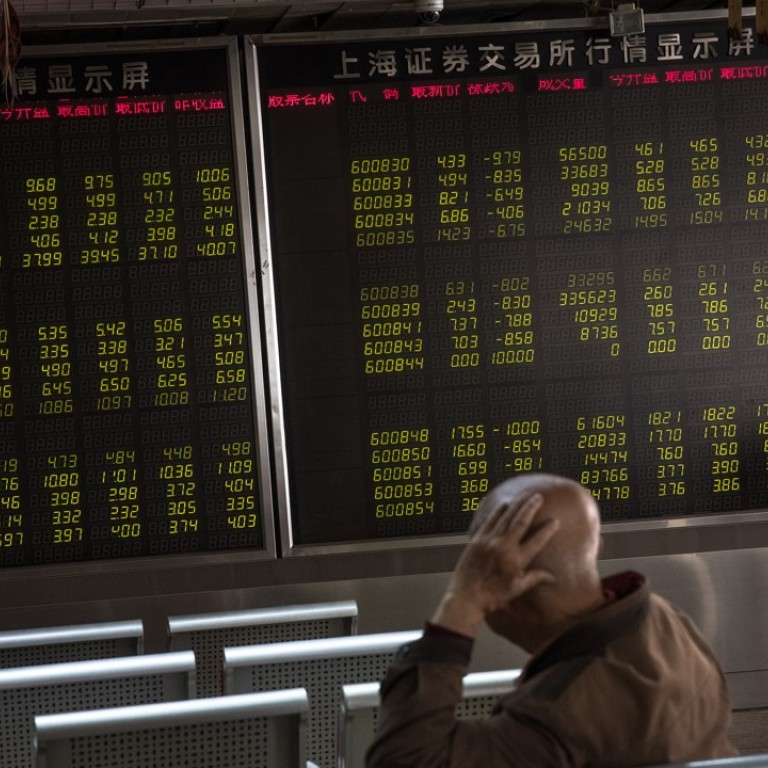
Hong Kong shares fall – again – to mark a near 18-month low
- Shanghai Composite recovers from morning slide
- Three days of losses for Hang Seng leave it at lowest level since May 9, 2017
Hong Kong shares dropped to their lowest levels in nearly 18 months on Thursday, while China’s main stock index turned around early losses after an overnight rout in the US spilled over into Asia.
Hong Kong’s Hang Seng Index closed down 1.01 per cent to 24,994.46, bringing its three-day losing streak to 4.5 per cent. Its close was the lowest since May 9, 2017. The index, which was one of the world’s best performers last year, is now down about 16.5 per cent for the year.
It and the Shanghai Composite Index started the day off struggling against deep overnight losses in US markets. But the Shanghai benchmark recovered, eking out the tiniest of gains, 0.02 per cent, to close at 2,603.8. It had been down by as much 2.8 per cent in the morning session.
Shanghai’s turnaround prompted some speculation that state-backed funds had intervened to put a floor under the world’s worst-performing major market this year.
The day’s reversal was reminiscent of how the state sought to shore up equities by directly buying shares after the market meltdown in 2015 that erased US$5 trillion in market cap. Brokerages and property developers led the turnaround, as the national team, as the state-linked funds are dubbed, was suspected of piling in.
“It’s entirely possible that the national team is entering at this stage,” said Dai Ming, a fund manager at Hengsheng Asset Management in Shanghai. “There’s a need for the government to do so. If nothing were done, the liquidity crisis would continue to spread, and what the government has done so far to prop up the market will be in vain.”
Eleven brokerages agreed on Monday to set aside 21 billion yuan (UD$3.02 billion) to bail out listed companies exposed to share-pledge risks, the latest follow-up measures after vice-premier Liu He openly voiced support for Chinese stocks on Friday. The Shanghai Composite has been stuck in a bear market, and is down 21 per cent for the year.
Louis Tse Ming-kwong, managing director of VC Asset Management, said the US market sell-off spooked global investors, prompting them to dump stocks.
“Mainland regulators injected a bit of money into the stock market, and there’s still some lingering optimism over that,” Tse said.
Gordon Tsui Luen-on, managing director of Hantec Pacific, said the outlook of Shanghai indices “is not optimistic”.
“Shanghai indices are just [marginally] higher today. I would not treat it as a positive outlook,” Tsui said. “Investors lack confidence in stock markets and indices are going downward until further concrete stimulating measures such as monetary or fiscal policy are implemented.”
Thursday morning’s slide was a reminder of how fragile the Chinese markets remain.
The Shanghai Composite had risen 4.7 per cent by the close of Wednesday since touching a four-year low last week. The Shanghai benchmark has been stuck in a bear market, and is down about 21 per cent for the year.
The CSI 300 Index of big companies added 0.2 per cent on Thursday, while the ChiNext gauge of small-caps shed 0.8 per cent.
Sealand Securities, Central China Securities and Pacific Securities all jumped by the 10 per cent daily limit. Citic Securities, the nation’s biggest listed, gained 2.5 per cent to 17.35 yuan.
Developers advanced on expectations that the government will ease its tightening on home sales to counter a slowdown in economic growth. Poly Developments and Holdings Group jumped 5.6 per cent and China Vanke surged 4 per cent.
Liquor distillers provided the drag on the broader market on concerns the government will raise tax rates to curb alcohol consumption and that slowing economic growth will rein in consumer spending. Kweichow Moutai, the world’s most valuable distiller, sank 2.8 per cent, extending a two-day, 8.1 per cent decline, and Wuliangye Yibin shed 2.7 per cent.
Top asset managers and brokerages from the fund unit of HSBC Holdings to UBS Group and Citic Securities remain cautious about the outlook for China’s stocks, saying the measures unveiled so far by the government will probably be outweighed by turmoil in global financial markets and a down cycle of China’s economy.


